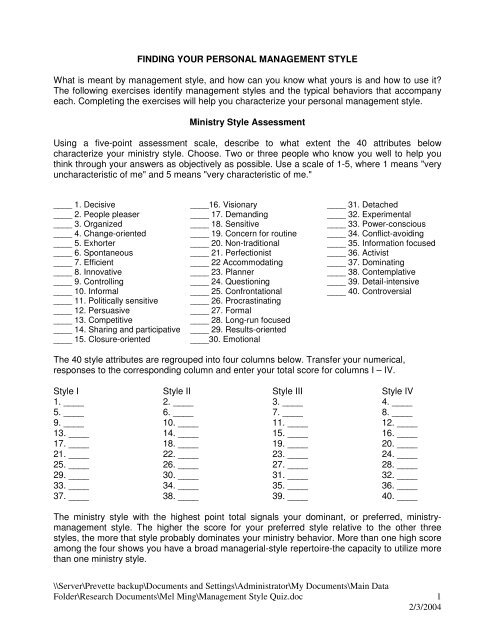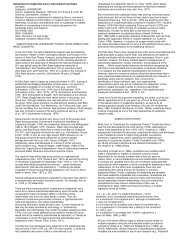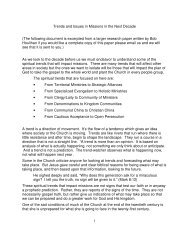Management Style Quiz - Prevette Research
Management Style Quiz - Prevette Research
Management Style Quiz - Prevette Research
Create successful ePaper yourself
Turn your PDF publications into a flip-book with our unique Google optimized e-Paper software.
FINDING YOUR PERSONAL MANAGEMENT STYLE<br />
What is meant by management style, and how can you know what yours is and how to use it?<br />
The following exercises identify management styles and the typical behaviors that accompany<br />
each. Completing the exercises will help you characterize your personal management style.<br />
Ministry <strong>Style</strong> Assessment<br />
Using a five-point assessment scale, describe to what extent the 40 attributes below<br />
characterize your ministry style. Choose. Two or three people who know you well to help you<br />
think through your answers as objectively as possible. Use a scale of 1-5, where 1 means "very<br />
uncharacteristic of me" and 5 means "very characteristic of me."<br />
____ 1. Decisive ____16. Visionary ____ 31. Detached<br />
____ 2. People pleaser ____ 17. Demanding ____ 32. Experimental<br />
____ 3. Organized ____ 18. Sensitive ____ 33. Power-conscious<br />
____ 4. Change-oriented ____ 19. Concern for routine ____ 34. Conflict-avoiding<br />
____ 5. Exhorter ____ 20. Non-traditional ____ 35. Information focused<br />
____ 6. Spontaneous ____ 21. Perfectionist ____ 36. Activist<br />
____ 7. Efficient ____ 22 Accommodating ____ 37. Dominating<br />
____ 8. Innovative ____ 23. Planner ____ 38. Contemplative<br />
____ 9. Controlling ____ 24. Questioning ____ 39. Detail-intensive<br />
____ 10. Informal ____ 25. Confrontational ____ 40. Controversial<br />
____ 11. Politically sensitive ____ 26. Procrastinating<br />
____ 12. Persuasive<br />
____ 27. Formal<br />
____ 13. Competitive<br />
____ 28. Long-run focused<br />
____ 14. Sharing and participative ____ 29. Results-oriented<br />
____ 15. Closure-oriented ____30. Emotional<br />
The 40 style attributes are regrouped into four columns below. Transfer your numerical,<br />
responses to the corresponding column and enter your total score for columns I – IV.<br />
<strong>Style</strong> I <strong>Style</strong> II <strong>Style</strong> III <strong>Style</strong> IV<br />
1. ____ 2. ____ 3. ____ 4. ____<br />
5. ____ 6. ____ 7. ____ 8. ____<br />
9. ____ 10. ____ 11. ____ 12. ____<br />
13. ____ 14. ____ 15. ____ 16. ____<br />
17. ____ 18. ____ 19. ____ 20. ____<br />
21. ____ 22. ____ 23. ____ 24. ____<br />
25. ____ 26. ____ 27. ____ 28. ____<br />
29. ____ 30. ____ 31. ____ 32. ____<br />
33. ____ 34. ____ 35. ____ 36. ____<br />
37. ____ 38. ____ 39. ____ 40. ____<br />
The ministry style with the highest point total signals your dominant, or preferred, ministrymanagement<br />
style. The higher the score for your preferred style relative to the other three<br />
styles, the more that style probably dominates your ministry behavior. More than one high score<br />
among the four shows you have a broad managerial-style repertoire-the capacity to utilize more<br />
than one ministry style.<br />
\\Server\<strong>Prevette</strong> backup\Documents and Settings\Administrator\My Documents\Main Data<br />
Folder\<strong>Research</strong> Documents\Mel Ming\<strong>Management</strong> <strong>Style</strong> <strong>Quiz</strong>.doc 1<br />
2/3/2004
Ministry <strong>Style</strong> Matrix<br />
Consider the following descriptions of management styles:<br />
<strong>Style</strong> I: Commanders (decisive, exhorter, controlling, competitive, demanding, perfectionist,<br />
confrontational, results- focused, power-conscious, dominating) combine a direct interpersonal<br />
style with a strong relationships orientation.<br />
Commanders like being in the driver's seat and thrive on using legitimate power to achieve<br />
ministry results.<br />
<strong>Style</strong> II: Shepherds (people-pleasing, spontaneous, informal, sharing and participative,<br />
sensitive, accommodating, procrastinating, emotional, conflict-avoiding, contemplative) are<br />
relational like commanders, but they prefer to facilitate (guide, encourage, equip) ministry<br />
members rather than to overly direct them.<br />
<strong>Style</strong> III: Managers (organized, efficient, politically-sensitive, closure-oriented, concern for<br />
routine, planner, formal, detached, information-focused, detail-intensive) use formal, official<br />
policies and procedures to efficiently direct ministry activities in a way that permits independent<br />
action and decision making, minimizing the need for group deliberation and participative<br />
management. Maintenance managers favor orderly, routine operations run "by the book."<br />
<strong>Style</strong> IV: Entrepreneurs (change-oriented, innovative, persuasive, visionary, nontraditional,<br />
questioning, long-run focus, experimental, activist, controversial) like to operate independent of<br />
organizational bureaucracy with an eye toward facilitating change and innovation.<br />
Entrepreneurs yearn to start projects hooked to a tantalizing vision of ministry progress.<br />
<strong>Management</strong> <strong>Style</strong> Situational Effectiveness<br />
Which of the four ministry styles is most effective? That depends on circumstances. Each style<br />
has unique strengths and weaknesses, depending on the needs of the particular ministry. The<br />
table below provides insight into the situational effectiveness of each style for the 1 0 most<br />
common managerial challenges.<br />
Commander Shephrd Managers Entrepreneur<br />
Jolting productivity A D B C<br />
Defusing conflict<br />
A B C D<br />
Fostering change D B C A<br />
Bolstering morale A B C D<br />
Implementing routine work B C A D<br />
Implementing new projects C D B A<br />
Building relationships D A C B<br />
Managing a crisis A D B C<br />
Goal setting B D A C<br />
Keeping in touch with<br />
people's feelings D A C B<br />
A = <strong>Style</strong> of greatest potential<br />
C = <strong>Style</strong> of third potential<br />
B = <strong>Style</strong> of second greatest potential<br />
D = <strong>Style</strong> with least potential<br />
\\Server\<strong>Prevette</strong> backup\Documents and Settings\Administrator\My Documents\Main Data<br />
Folder\<strong>Research</strong> Documents\Mel Ming\<strong>Management</strong> <strong>Style</strong> <strong>Quiz</strong>.doc 2<br />
2/3/2004
<strong>Management</strong>-style flexibility is a cardinal virtue. You need to strive to utilize your preferred style<br />
(the one God has especially suited you for) in as many situations as possible that benefit from<br />
its strengths. You should also use any strong subordinate styles in a similar fashion.<br />
It's important to know where your style strengths are ineffective and seek out partnership<br />
opportunities with other leaders who hold complementary style strengths. Ultimately, all<br />
Christian ministry is a partnership between interdependent team members empowered by God<br />
to do His kingdom work.<br />
-James D. Berkley, Leadership Handbooks of <strong>Management</strong> and Administration, published by<br />
Baker Books, a division of Baker Book House Company, copyright used with permission.<br />
\\Server\<strong>Prevette</strong> backup\Documents and Settings\Administrator\My Documents\Main Data<br />
Folder\<strong>Research</strong> Documents\Mel Ming\<strong>Management</strong> <strong>Style</strong> <strong>Quiz</strong>.doc 3<br />
2/3/2004




